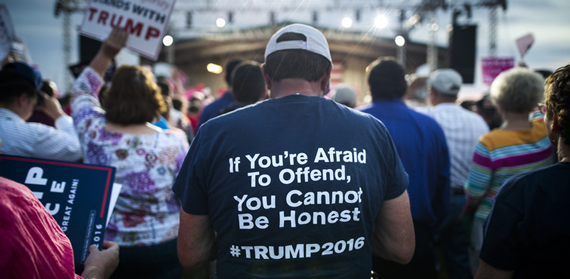A Trump supporter attends a rally ahead of the vote. EPA/Jim Lo Scalzo
Guest post by David Baker
Here in North Carolina, a battleground state some tipped Clinton to take, Trump won by a comfortable margin. The candidates had been frequent visitors to the state, both holding rallies the day before the vote. The final poll here suggested a one-point gap between Trump and Clinton. Trump ultimately looks to have beaten Clinton here by as many as 125,000 votes, dwarfing Barack Obama’s 2008 margin of 14,000.
Looking at what explains the Trump support, one case in particular exemplifies the issue – the highly controversial HB2 law (the so-called “toilet law”), which denies trans people the right to use the bathroom of their choice. This has brought much opprobrium, from inside and outside the US. North Carolina’s opposition to liberalising the law is seen to be illustrative of conservative “Southern rights”, whereby states push back against federal laws and exert their right to govern as they see fit. That’s something Trump is likely to support and encourage.
North Carolina has also struggled economically, losing jobs 15-20 years ago across traditional manufacturing businesses such as textiles and furniture. It’s a prime example of the classic “job migration” Trump has emphasised throughout his campaign.
And while the recent riots in Charlotte over the police shooting of Keith Scott also highlighted concerns about the state’s black population being left behind as the gap between rich and poor widens, they also stoked fears about law and order – another of Trump’s focus issues.
The feeling is that Obama won the state in 2008 on the basis of a coalition of young voters, black voters and women voters – and that this did not happen this time. It appears that the Republicans have boosted voter numbers substantially compared to 2012.
The state governor was an early champion of Trump and has not wavered in his support. When compared with 2012, early counts suggested that the Democrat vote was down and black voter numbers were also reduced. There have been mutterings from some local Democrats about voter suppression, whereby voter ID requirements are tightened and early voting windows narrowed – another echo from the history of the American south.
Originally written for ‘the Conversation’.




Comments are disabled